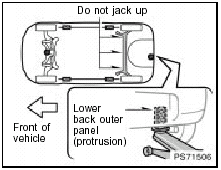 Toyota Yaris: Positioning the jack
Toyota Yaris: Positioning the jack

When jacking up your vehicle with the jack, position the jack correctly as shown in the illustration.
Jack position  .
.
Front—Front suspension member.
Rear—Lower back outer panel.
Support position for
Pantograph jack  .
.
CAUTION.
When jacking, be sure to observe the following to reduce the possibility of personal injury: Follow jacking instructions.
Do not put any part of your body under the vehicle supported by a jack. Personal injury may occur.
Do not start or run the engine while your vehicle is supported by the jack.
Stop the vehicle on a level firm ground, firmly set the parking brake and put the transmission in “P” (automatic) or reverse (manual).
Block the wheels on the opposite side of the jack up point if necessary.
Make sure to set the jack properly in the jack point. Raising the vehicle with jack improperly positioned will damage the vehicle or may allow the vehicle to fall off the jack and cause personal injury.
Never get under the vehicle when the vehicle is supported by the jack alone; use vehicle support stands.
Do not raise the vehicle with someone in the vehicle.
When raising the vehicle, do not place any objects on top of or underneath the jack.
NOTICE.
Make sure to place the jack correctly, or your vehicle may be damaged.
 Parts and tools
Parts and tools
Here is a list of parts and tools you will need to perform do-it-yourself maintenance.
Remember all Toyota parts are designed in metric sizes, so your tools must be
metric.
CHECKING THE ENGINE OIL ...
See also:
Tires
Replace or rotate tires in accordance with maintenance schedules and treadwear.
■ Checking tires
New tread
Treadwear indicator
Worn tread
The location of treadwear indicators is shown ...
Dimensions and weights
Overall length
mm (in.)
3825 (150.6)
Overall width
mm (in.)
1695 (66.7)
Overall height
mm (in.)
1530 (60.2)
Wheelbase
mm (in.)
2460 (96.9)
...
Quarter wheel housing outer panel (ASSY)
REPLACEMENT
With the quarter panel removed.
REMOVAL
INSTALLATION
Temporarily install the new parts and measure each part of the new parts in accordance
with the body dimension diagram. ...

